Giro d'Italia: Chris Froome defiant despite looming salbutamol case
Team Sky leader preparing for the unexpected at Giro
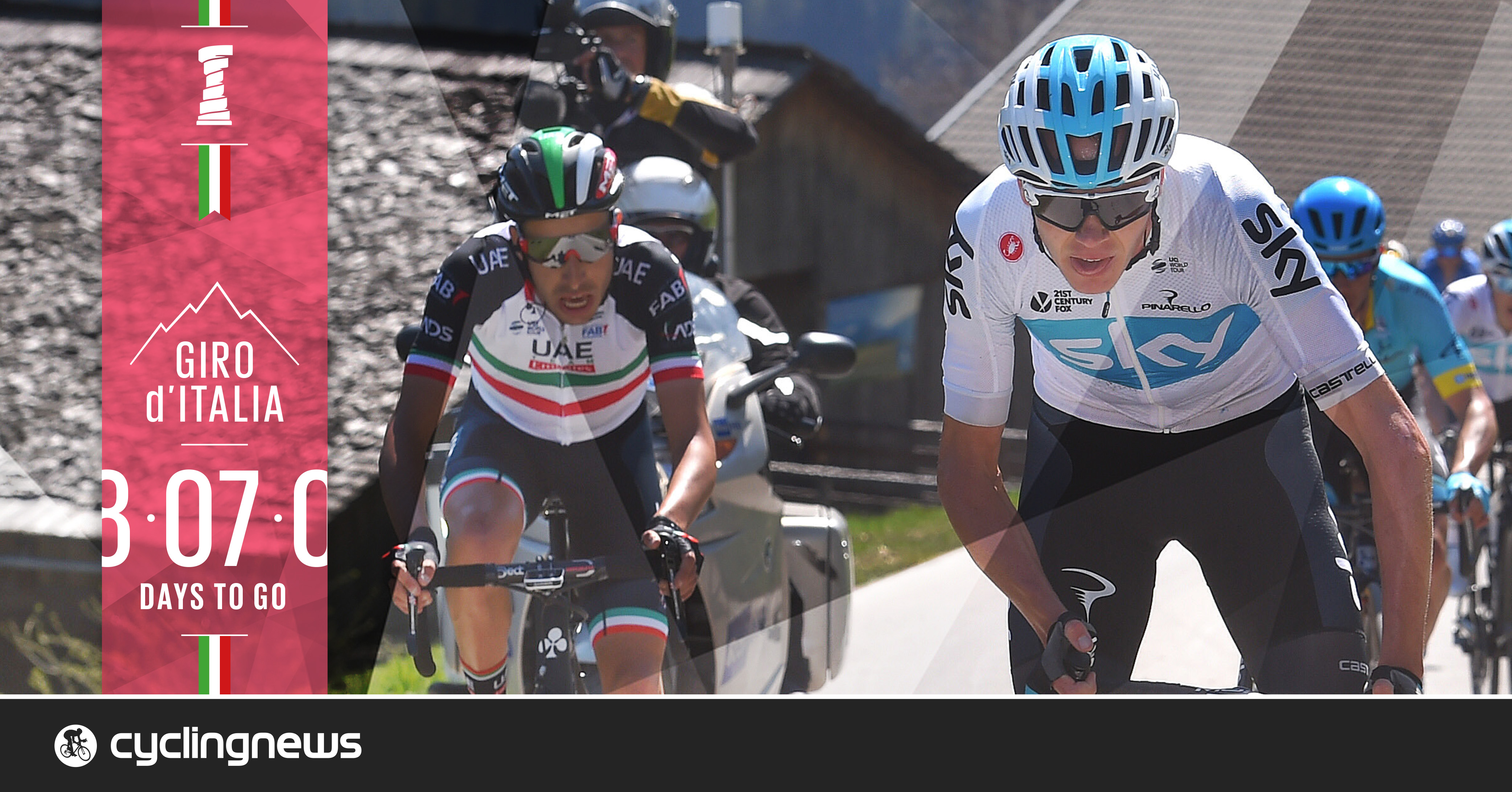
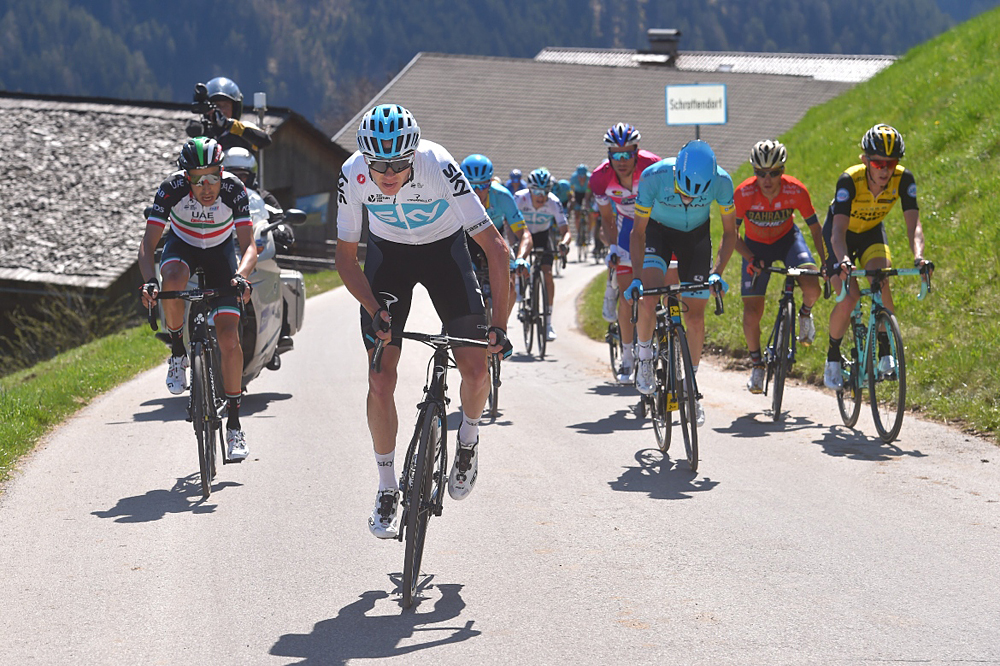
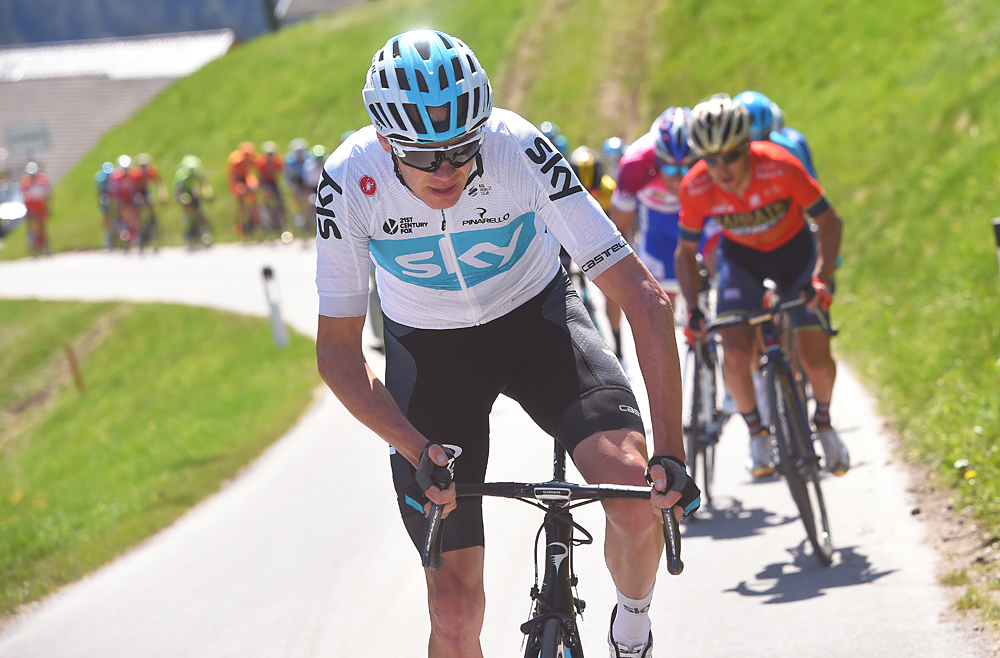
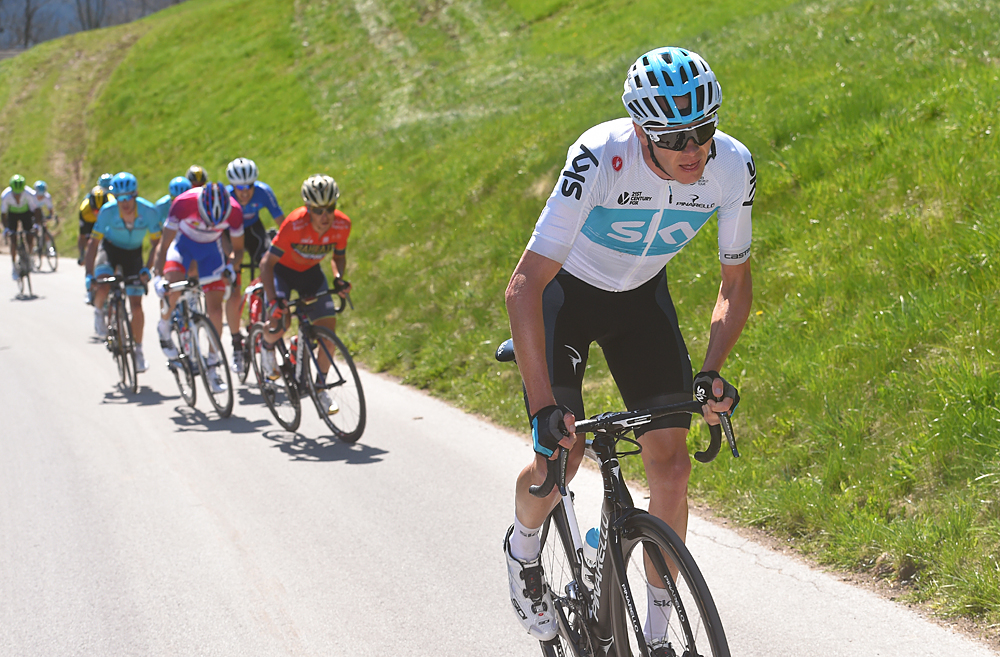
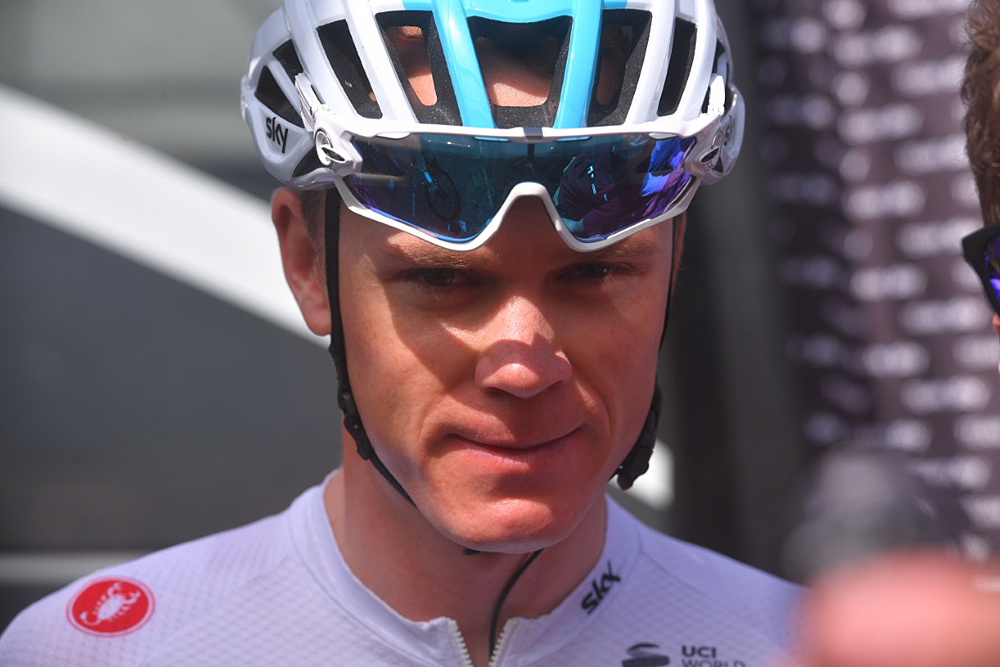
Chris Froome has told Cyclingnews he believes he will be fully exonerated when his ongoing salbutamol case finally reaches a conclusion.
Chris Froome's salbutamol case reportedly heading to UCI Anti-Doping Tribunal
Lack of verdict in Chris Froome case is 'completely grotesque' says Prudhomme
Lappartient: It would be difficult for Froome to ride the Tour de France without a verdict
Chris Froome's defence team may question validity of salbutamol test
Lappartient: Chris Froome's case will not be resolved before the Giro d'Italia
Chris Froome begins Giro d'Italia countdown with recon trip to Italy
Chris Froome: You can't read too much into Tour of the Alps result
Team Sky announce Giro d'Italia team to support Chris Froome
Froome has to justify why double the permitted level of salbutamol was found in an anti-doping control at the Vuelta a España but he insists he has done nothing wrong. While his legal team fight his case with the UCI, Froome is focused on targeting both the Giro d'Italia and Tour de France this summer to become the first rider of his generation to ever win three consecutive Grand Tours.
Froome came across as quietly defiant and determined during when he spoke with Cyclingnews before the Giro d'Italia.
Normally soft-spoken and polite, Froome's voice and body language change when he is asked about his salbutamol case. He would rather talk about bike racing than revealing details of his legal defence, convinced that his case should never have been made public.
Despite risking a ban from competition if his salbutamol case is declared an anti-doping rule violation, Froome insists he is not thinking about losing any of the results he may secure at the Giro d'Italia if he is eventually banned from competition, as was the case when Alberto Contador was stripped of his 2011 Giro win.
"I'm planning for the best-case scenario, to be fully exonerated, coming from the basis that I know I've done nothing wrong. That's what I'm planning for," Froome tells Cyclingnews sternly, limiting his answers to questions about his case but showing determination in his body language and words that suggested he believes he has not done anything wrong.
Froome's Vuelta sample contained twice the allowed limit of asthma drug salbutamol, which is a 'specified substance' and does not automatically trigger a provisional suspension under the rules, and he is allowed to continue to race under UCI and WADA rules. Although the UCI's policy suggests that it only announces provisional suspensions through a published list, Froome's case was made public through a joint investigation by the Guardian and Le Monde.
Get The Leadout Newsletter
The latest race content, interviews, features, reviews and expert buying guides, direct to your inbox!
He has been under intense pressure to recuse himself from racing since his case went public on December 13 in the reports. Two weeks earlier, during the presentation of the 2018 Giro route, Froome confirmed he would be at the start in Israel as he tried to follow his 2017 Tour de France-Vuelta a España success with a Giro-Tour double in 2018. Then there was genuine excitement as he promised to take on another Grand Tour challenge. Now he will arrive in Israel under a cloud of suspicion.
The Giro d'Italia organisers still seem happy to have Froome in the race but UCI president David Lappartient has tried to pressure him to avoid racing subjudice, suggesting it leaves cycling in an untenable situation.
With expert legal teams fighting over every detail of the case, the UCI has yet to fully transfer the case from its Anti-Doping Service (LADS) office to the UCI Anti-Doping Tribunal. Froome also has a right to appeal any verdict to the Court of Arbitration for Sport. Any final verdict could create a legal precedent and possibly rewrite the WADA rules on salbutamol use.
Froome and his legal team, headed by the highly experienced but costly Mike Morgan, have kept their defence strategy close to their chest. After an altitude training camp on Mount Teide, Froome raced the Tour of the Alps last week, finishing fourth overall, 16 seconds down on winner and Giro d'Italia rival Thibaut Pinot (Groupama-FDJ). He was competitive but far from dominant, losing time on some climbs when the serious attacks came, only to close the gaps on the descents or thanks to the work of loyal teammate Kenny Elissonde.
Froome was dismissive after the final stage to Innsbruck, happy, despite his lack of success. "I don't think that we can read too much into it. Everyone has different approaches to the Giro," he says. Indeed, racing seemed a pleasant distraction from his salbutamol case.
"It's been great because it's very easy just to get stuck into the racing. I'm not really getting pulled into that side of things," Froome tells Cyclingnews when asked about the difficulties of combining racing with his legal battle.
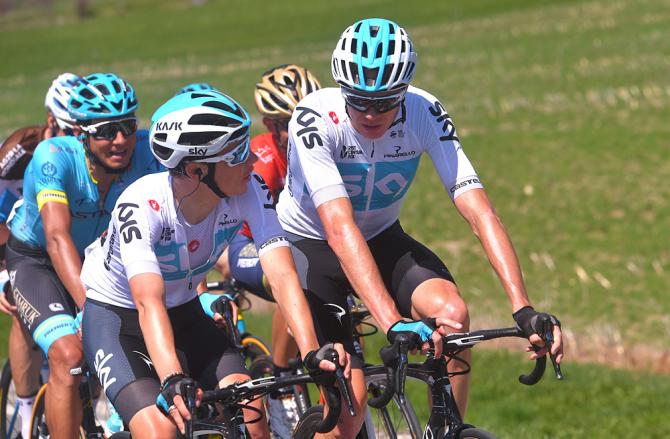
Going for the Froome Slam
Froome heads to Israel with the idea of a Giro-Tour double still very much on his mind. He may be quietly bracing himself for a possible suspension before July but he seems able to separate his legal battle from his racing and put on a brave face. Self-confidence is half the battle and Froome seems to fancy his chances of clearing his name, winning the Giro d'Italia and becoming the first rider since Bernard Hinault in 1982 to hold all three Grand Tour titles at once. Hinault won the Giro d'Italia and Tour de France in 1982, and then the following year's Vuelta a España, which at the time was held in late April.
Such a triple has been likened to the Tiger Slam, Tiger Woods' achievement of holding all four major titles in golf across 2000 and 2001. Froome seemed unaware of what the Tiger Slam is but is motivated by the idea of a Grand Tour Froome slam.
"I can't remember the last time a rider won three Grand Tours consecutively. I don't think a rider in my generation has ever done that, so it'd be pretty special for me," Froome tells Cyclingnews.
"I've never gone for a Giro, racing for the win. After winning the Tour again and then the Vuelta on the back of it, the natural question was: are you going to go for the Giro now? Initially my response was that I didn't want to compromise a chance of a fifth Tour de France victory but once I sat down with the team, and in particular my coach Tim Kerrison, I looked at what it would be like to go for the Giro d'Italia before going onto the Tour de France.
"Given that I was able to do the Tour-Vuelta last year, I think I learnt a lot about the transition between two Grand Tours and how to manage myself between them. We've got six weeks this year, compared to just the four between the Tour and Vuelta, it makes it even more manageable.
"Also the way the Giro is laid out this year, with the start in Israel and the early extra rest day [on the first Monday -ed.], it made a lot of sense to go for it."
Froome will reportedly be paid €1.4 million to ride the Giro, though race director Mauro Vegni quickly denied that RCS Sport has coughed up the appearance fee, with the incentive possibly coming from someone in Israel keen to see the Grand Partenza garner as much global attention as possible.
There are concerns about the political tension in the Middle East and there have been calls from Palestinian solidarity movements for a boycott, with some fears of protests during the Giro d'Italia stages in Israel, especially as the state prepares to celebrate the 70th anniversary of its foundation.
Like most riders in the peloton, Froome avoids the issue, preferring not to mix politics, religion and sport, when asked about the situation during the Tour of the Alps.
"I'm not one to get involved in politics; I'm a bike rider. If a race starts in Israel, we're required to be there to start. I don't like to get involved in politics as a person," he says.
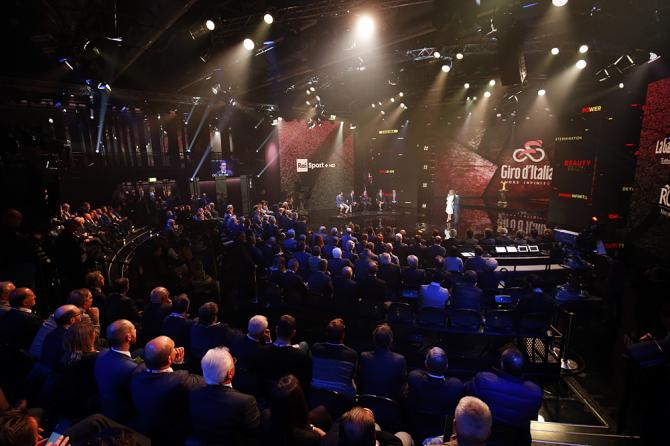
A brutal Giro d'Italia, a Grand Tour of Classics
Froome spent the weekend before the Tour of the Alps doing vital reconnaissance in the northeast of Italy, studying the steep Monte Zoncolan climb, stage 15 to Sappada and the important 34km flat time trial from Trento to Rovereto. He had a packed schedule but nothing was left to chance.
The time trial will give Froome and 2017 Giro winner Tom Dumoulin (Sunweb) a distinct advantage on the likes of Fabio Aru (UAE-Team Emirates), Thibaut Pinot (Groupama-FDJ), Esteban Chaves and Simon Yates (Mitchelton-Scott). But he knows the final mountain finishes to Prato Nevoso, Bardonecchia and Cervinia give the climbers a chance to pull back time and topple Froome if he is in the maglia rosa.
"It's a brutal Giro," Froome says. "There are a lot of really tough mountain stages. The time trial is going to be critical as well. But it's not going to be one stage, that's for sure. The pure climbers won't necessarily be looking forward to the time trial because is predominately flat but then again there are a lot of big climbs. The Zoncolan obviously stands out as a crucial climbing day for the climbers to get time back on the likes Tom Dumoulin, who should open up their advantage in the time trial."
The Giro d'Italia rarely follows a logical pattern – that is what makes it such an entertaining race to watch. The twisting, rough and rolling Italian roads, the unpredictable hot, cold and possibly wet weather are all factors in deciding who emerges as the final winner. The overall contenders must adapt to the conditions and racing, with even Team Sky unable to control or foresee every eventuality the race throws up.
Team Sky have tried and failed to win the Giro d'Italia in recent years. Bradley Wiggins crashed and cracked in the rain in 2013, Richie Porte struggled in 2015, Mikel Landa quit due to illness in 2016 and Geraint Thomas crashed out last year after hitting a poorly parked police motorbike.
Froome knows that Team Sky will have to be far more vigilant and flexible in the way they race the Giro d'Italia. Big data and riding to watts can help neutralise their Tour de France rivals but the Giro is far more difficult to control.
"It's more like a series of one-day races, it's a Grand Tour of Classics almost, where anything really can happen at any moment. I think for that reason, it's not an easy one to win," Froome says, justifying Team Sky's previous failures.
"What you put in isn't necessarily what you get out. You can be there with the strongest rider and best team, but circumstances change out on the road and you've got to adapt to that. In the past things have happened. Most of the time our guys have been caught up in crashes or something has happened somewhere and that meant they've lost time or crashed out of the race."
Froome rode the Giro d'Italia in 2009 with Barloworld, finishing 32nd overall, and then in 2010 in his first season with Team Sky. He was expelled from the race on stage 19 for holding onto a police motorbike but claimed that he had already quit the race due to a knee injury and was simply trying to get to the feed zone to climb off.
He returns as a totally different rider, having won the Tour de France four times and aiming for Grand Tour Grand Slam despite his salbutamol case hanging like a sword of Damocles over his career. Yet armed with a near-fluent Italian to charm the tifosi and the Italian media, a strong Team Sky squad, and growing, if not yet brilliant form, Froome headed home from the Tour of the Alps feeling he is on track for the Giro. He planned to do some final training at home in Monaco before flying to Israel at the start of next week.
"I haven't done a lot of racing in Italy but I'm learning as much as I can. Having done the Tour of the Alps and also Tirreno-Adriatico, that'll put me in good stead for what's to come," he suggests.
"I'm definitely a lot closer to being ready for the Giro than I was a month ago. I'm really happy with the sensations now. It's been pretty much a perfect build-up to the Giro d'Italia."
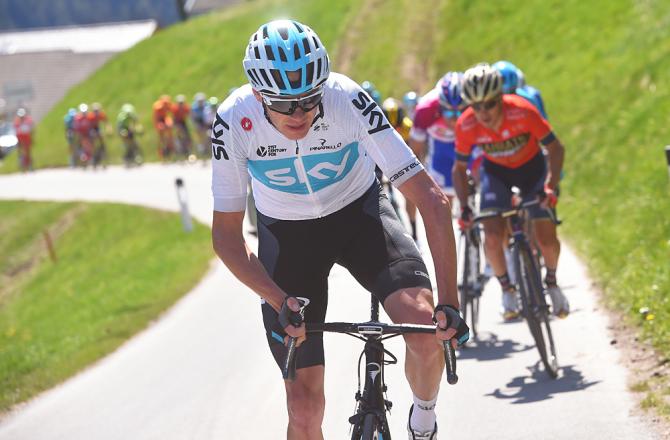

Stephen is one of the most experienced member of the Cyclingnews team, having reported on professional cycling since 1994. He has been Head of News at Cyclingnews since 2022, before which he held the position of European editor since 2012 and previously worked for Reuters, Shift Active Media, and CyclingWeekly, among other publications.